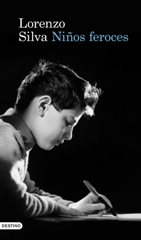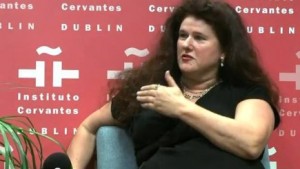Blog del Instituto Cervantes de Dublín
Torre Martello
Recital literario: Poesía útil con Ángel Guinda | Poetry reading: Useful Poetry with Ángel Guinda
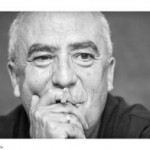 El Instituto Cervantes de Dublín y la editorial Olifante tienen el placer de presentarles hoy a las 18:00 en el Café Literario este recital poético del autor español Ángel Guinda, quién mostrará una proyección de videoclips sobre su poética (Arquitextura) y Manifiestos (Poesía útil, Antimanifiesto, Manifiesto No) además de videopoemas. A los audiovisuales les seguirá una lectura comentada por el propio autor y un coloquio. Presenta y conversa con el autor, Jennifer Wood (NUI Maynooth)
El Instituto Cervantes de Dublín y la editorial Olifante tienen el placer de presentarles hoy a las 18:00 en el Café Literario este recital poético del autor español Ángel Guinda, quién mostrará una proyección de videoclips sobre su poética (Arquitextura) y Manifiestos (Poesía útil, Antimanifiesto, Manifiesto No) además de videopoemas. A los audiovisuales les seguirá una lectura comentada por el propio autor y un coloquio. Presenta y conversa con el autor, Jennifer Wood (NUI Maynooth)
Ángel Guinda (Zaragoza, 26 de agosto de 1948) es un escritor español conocido sobre todo por su poesía, aunque su obra abarca géneros muy variados: artículos en periódicos y revistas, ensayos y traducciones. Fundó la Colección Puyal de libros de poesía en 1977 y la revista Malvís en 1988. Ha publicado más de una veintena de libros y es coautor de la letra del Himno de Aragón. En 2010 fue galardonado con el Premio de las Letras Aragonesas.
Ángel Guinda dará una charla en la Universidad de Maynooth el martes 23 de octubre a las 17:00 h.
Instituto Cervantes Dublin and Olifante Publishing House are delighted to present this poetry recital today at 6pm at Café Literario by Spanish author Ángel Guinda. He will screen a series of video clips about his poetry (“Arquitextura”) and Manifestos (“Poesía útil”, “Antimanifiesto”, “Manifiesto No”) as well as video poems. The videos will be followed by a recital with comments by the author and a Q&A session. Introuced by Jennifer Wood (NUI Maytnooth)
Ángel Guinda (Zaragoza, August 26th, 1948) is a Spanish writer known mainly for his poetry, although his work extends to various genres: newspaper and magazine articles, essays and translations. He founded the Colección Puyal of poetry books in 1977 and the Malvís magazine in 1988. He has published over twenty books and is the co-author of the lyrics to the Aragón anthem. In 2010 he received the award Premio de Letras Aragonesas.
Ángel Guinda will offer a lecture at the University of Maynooth in October 23rd, at 5 pm.
Audiolibro de la semana | Audiobook of the Week: Lo que me queda por vivir
La popular escritora y periodista Elvira Lindo es la autora de la novela Lo que me queda por vivir. Esta semana os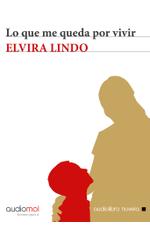 recomendamos que disfrutéis de esta obra a través de nuestro servicio de audiolibros. Si todavía no sabes como utilizarlo verás que es muy fácil, solo necesitas tu carnet de la biblioteca y hacer click aquí.
recomendamos que disfrutéis de esta obra a través de nuestro servicio de audiolibros. Si todavía no sabes como utilizarlo verás que es muy fácil, solo necesitas tu carnet de la biblioteca y hacer click aquí.
Antonia tiene veintiséis años cuando se ve sola con un niño de cuatro en el cambiante Madrid de los ochenta. La suya es la historia de un viaje interior y la crónica de un aprendizaje, el de una mujer que se enfrenta a la juventud y a la maternidad mientras intenta hacerse un lugar en la vida, en una ciudad y en una época de tiempo acelerado, más propicio a la confusión que a la certeza, sobre todo para alguien que ha tenido una experiencia demasiado temprana de la pérdida y de la soledad.
The popular writer and journalist Elvira Lindo is the author of the novel Lo que me queda por vivir. This week we recommend you to enjoy this work through our audiobook downloading service. If you still don´t know how to use it, you can see how easy it is, you just need your library card and make click here.
Antonia is 26 years old when she finds herself with a four year old in a changing Madrid during the 80s. It is the story of an inner journey and the chronicle of a learning process, the one experienced by a woman who faces youth and motherhood while she tries to find her place in life and in a city during fast times. A time more suitable for confusion than for certainty, specially for someone who has lived loss and loneliness too soon.
Festival Literario ISLA / ISLA Literary Festival
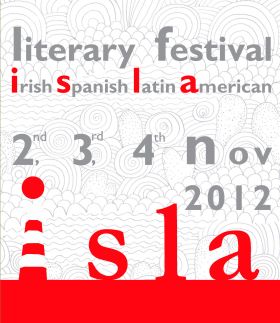 Irlanda es una isla grande y fértil. Una isla sembrada de escritores y de buena literatura. Un escritor, en algún momento de su labor creativa, también ha de convertirse en una isla, retirarse en silencio hasta el lugar en donde se encuentran las palabras, esas mismas palabras que luego descubrirá algún lector solitario, como un tesoro en una isla pirata, un tesoro en forma de libro.
Irlanda es una isla grande y fértil. Una isla sembrada de escritores y de buena literatura. Un escritor, en algún momento de su labor creativa, también ha de convertirse en una isla, retirarse en silencio hasta el lugar en donde se encuentran las palabras, esas mismas palabras que luego descubrirá algún lector solitario, como un tesoro en una isla pirata, un tesoro en forma de libro.
Un buen libro es una isla que contiene el universo.
ISLA es también el nombre que hemos querido dar a nuestro festival de literatura. Es el acrónimo de “Irish, Spanish and Latin American” Literary Festival. Es por tanto, también, una ISLA grande, fértil y multicultural en la que estamos todos unidos, irlandeses, latinoamericanos y españoles, por primera vez, en torno a la literatura.
Nunca antes se había celebrado un festival de estas características. Sin embargo, creemos que hacía ya mucho tiempo que venía siendo necesario. Hoy, gracias al entusiasmo demostrado tanto por Dublin UNESCO City of Literature, Ireland Literature Exchange, Poetry Ireland y el apoyo de las universidades Dublin City University, NUI Galway, NUI Maynooth y Trinity College Dublin, como por las embajadas de Argentina, Chile, Cuba, México y por supuesto por la Embajada de España, de la que el Instituto Cervantes forma parte, este festival es una realidad. Solo podemos tener palabras de agradecimiento para todos ellos.
Y aquí estamos todos, unidos en este proyecto. Comprometidos, comunicados, reunidos en este hermoso territorio común en el que hemos depositado tantas ilusiones.
No tiene sentido que algunas de las literaturas más fecundas del planeta sigan viviendo de espaldas entre sí. Es necesario que del intercambio de experiencias e ideas, de un mejor conocimiento entre unos y otros surjan nuevas traducciones, nuevos libros y, sobre todo, nuevos lectores.
Bienvenidos a nuestra ISLA.
Ireland is a great and fertile Island. It is an Island cultivated with writers and high quality literature. A writer during the course of his creative work must also become an island, withdrawing in silence to a place where words are kept. Those same words which some solitary reader will discover like hidden treasure on a pirate island, treasure in the form of a book.
A good book is a universe within an island.
The Spanish for ‘island’ is ‘ISLA’. It is the name we have chosen for our Literary Festival. It is the acronym for ‘Irish, Spanish and Latin American’ Literary Festival. It is also in that way a great, fertile and multicultural island where the Irish, Latin Americans and Spanish for the first time are all united and gathered around literature.
Never before has such a festival taken place. However, we believe it to be a much needed, unique event that has been a long time coming. Today, and thanks to the enthusiasm of Dublin UNESCO City of Literature, Ireland Literature Exchange, Poetry Ireland and the support of Dublin City University, Trinity College Dublin, NUI Galway, NUI Maynooth, the Embassies of Argentina, Mexico, Chile and Cuba, and by the Spanish Embassy, of which Instituto Cervantes is a part, this Festival is now a reality. We can only offer words of sincere gratitude to all of them.
We are all here, united in this project. Committed, connected and gathered together in this beautiful shared place where we have invested so many dreams.
It does not make sense that some of the most fertile literary figures on the planet should live in disregard for one another. It is imperative that from the exchange of experiences and ideas and from a better understanding between one another, new translations, new literature and, above all, new readers should emerge.
We wish you a warm welcome to our ‘island’ ISLA.
Autor del mes | Author of the month: Lorenzo Silva
Nuestro autor del mes de octubre es Lorenzo Silva (Madrid, 1966), uno de los escritores con el que tendremos el gusto de contar el mes que viene en el Festival ISLA, que celebramos en el Instituto Cervantes y al que por supuesto, quedáis todos invitados. Se trata de uno de los autores más representativos del panorama literario actual con una obra prolífica y de gran calidad, que ha traspasado nuestras fronteras habiendo siendo traducida a varios idiomas. Su estilo literario se caracteriza por ser ágil, directo y cercano, haciendo uso de un sentido del humor refinado y exquisito.
Curiosamente, su trayectoria laboral empezó siendo auditor de cuentas, asesor fiscal y abogado, simultaneando al mismo tiempo su labor literaria que comenzó en el año 1980.
A partir del año 2002 decidió dedicarse en exclusiva a su trabajo literario con la publicación de numerosos trabajos en narrativa, ensayos, libros de viajes e incursiones en la literatura infantil y juvenil. Es colaborador en varios medios de comunicación.
Es autor de novelas como La sustancia interior, La flaqueza del bolchevique o Niños feroces, del libro de relatos El déspota adolescente y del libro de viajes Del Rif al Yebala. Viaje al sueño y la pesadilla de Marruecos. En 2004 editó, junto a Marta Cerezales y Miguel Ángel Moreta, La puerta de los vientos, una antología de narradores marroquíes contemporáneos. En 2006 publicó junto a Luis Miguel Francisco Y al final, la guerra, un libro-reportaje sobre la intervención de las tropas españolas en Irak, y en 2008 el ensayo El Derecho en la obra de Kafka.
También es autor de la popular serie policíaca protagonizada por los investigadores Bevilacqua y Chamorro, que cuenta con seis entregas hasta la fecha. Millones de seguidores esperan con impaciencia cada nuevo título sobre la peripecia de esta singular pareja que camina al ritmo de los cambios sociales, políticos y culturales que van transformando la realidad española.
Su trabajo ha sido reconocido con premios tan prestigiosos como el Premio Nadal de Novela 2000 con El alquimista impaciente, el Premio Primavera de Novela 2004 con Carta Blanca. También fue finalista con La flaqueza del Bolchevique al Premio Nadal de Novela en el año 97.
Desde la biblioteca os invitamos a conocer a este autor poniendo a vuestra disposición una selección de su obra.
Our author of the month in October is Lorenzo Silva (Madrid, 1966). He will be here with us next month, participating in the Literary Festival ISLA organized at Instituto Cervantes. We are delighted to invite you all to this event.
He is one of the most representative writers of the Spanish literary scene today, with a prolific and high quality work that has crossed borders and been translated into several languages. His literary style is lively, direct and close, using a subtle and ironic sense of humour.
Surprisingly, he started his career as an auditor, tax consultant and solicitor while he also commenced his literary work in 1980.
He decided to focus in writing in 2002 and since then, he has published a wide variety of works in narrative, essays, travel books and incursions in children´s and young adult literature. He contributes to several means of communication.
He is the author of novels such as La sustancia interior, La flaqueza del bolchevique or Niños feroces, the short-stories book El déspota adolescente and the book of travels Del Rif al Yebala. Viaje al sueño y la pesadilla de Marruecos. He edited along with Marta Cerezales and Miguel Ángel Moreta, La puerta de los vientos, an anthology of comtemporary Moroccan narrators. He published in 2002 in cooperation with Luis Miguel Francisco, Y al final, la guerra, a documentary-book about the involvement of Spanish troops in Irak and in 2008, the essay El Derecho en la obra de Kafka.
He has also written a popular detective series starring the investigators Bevilacqua and Chamorro. The series has six novels up to this time. Millions of fans wait impatiently for each new book about this singular couple who walks at the same pace as social, political and cultural changes transform the Spanish reality.
His work has been recognized with prestigious awards like the Nadal Award in 2000 for El alquimista impaciente or the Primavera Award in 2004 for Carta Blanca.
He was short-listed as well with La flaqueza del Bolchevique for the Nadal Award in 1997.
We invite you to find out more about Lorenzo Silva´s books here at the library where we have a selection of his work.
Audiolibro de la semana / Audiobook of the week: El padre de Blancanieves
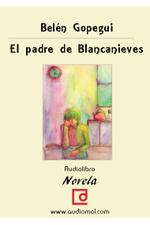 El audiolibro de la semana nos llega de la mano de Belén Gopegui con el enigmático título de El padre de Blancanieves. Para descargártelo, solo tienes que pulsar aquí con tu nombre de usuario y contraseña.
El audiolibro de la semana nos llega de la mano de Belén Gopegui con el enigmático título de El padre de Blancanieves. Para descargártelo, solo tienes que pulsar aquí con tu nombre de usuario y contraseña.
En El padre de Blancanieves, una profesora de instituto espera en su casa a que el repartidor del supermercado le traiga la compra. El repartidor se retrasa y ella se marcha. Horas después encuentra que le han dejado la compra a unos vecinos y se han estropeado los productos congelados.
La profesora llama al supermercado para quejarse. Al día siguiente, aún no se ha quitado el pijama cuando llaman al timbre; es el repartidor del supermercado, un hombre de Ecuador. El hombre le dice que por causa de su llamada telefónica le han despedido.
La profesora lamenta el incidente, pero el hombre insiste: ella es responsable de su despido, debe encontrarle otro empleo. A partir de ese momento, la vida de la profesora se ve afectada, y con ella, la vida de su familia.
Our audiobook of the week comes from the hand of Belén Gopegui with the enigmatic title of El padre de Blancanieves. To download it, just click here with your user name and password.
In El padre de Blancanieves, a school teacher is at home waiting for the delivery man that will bring her grocery shopping. He is late and she goes to work. When she returns, she realize that the delivery man left her products with her neighbors, and the frozen products are spoiled.
She calls the store to complain. The next day, she still has not taken off his piyama when the doorbell rings. It is the delivery man from the supermarket, a man from Ecuador. The man says that because of his phone call, he has been fired.
The teacher regrets the incident but the man insists, she is responsible for his firing. From that moment, the teacher’s life is affected, and with it, the life of her family.
[Video] Cecilia Gandarias habla sobre la exposición «Geografía Postal»
En la primera mitad del siglo XX, las familias García Lorca y De los Ríos se enviaban postales casi todos los días, creando así una amplísima colección que ahora se expone en el Instituto Cervantes. Cecilia Gandarias, comisaria de la exposición, nos habla de cómo surgió la idea para esta exposición y de como se realizó la selección de las postales.
La exposición estará abierta del 20/09/2012 al 17/11/2012.
El horario de visita es: Lun.- jue.: 14-19 h. Sáb: 10-14 h. Cerrado vie., dom. y festivos
In the first half of the 20th Century two families, García Lorca and De los Ríos, sent each other postcards almost daily. A selection of this huge collection of postcards is now on display at the Instituto Cervantes in Dublin. Cecilia Gandarias, exhibition curator, explains us in this video how they came to the idea of organizing this exhibition and how Martin Parr, photographer and specialist in postcards, made the selection.
This display will bring us closer to the most intimate side of the poet´s life.
The exhibition is open fro the 20/09/2012 to 17/11/2012.
Opening hours: Mon-Thur: 2-7pm. Sat: 10am-2pm. Closed on Fridays, Saturdays and Bank Holidays.
Audiolibro de la semana | Audiobook of the week: El tiempo de Manolo
Si todavía no conoces el servicio de audiolibros para los socios de la biblioteca, solamente tienes que hacer click aquí para ver lo fácil que es usarlo. Es una forma amena de practicar vuestro español y la ventaja es que podéis llevaros cientos de historias a cualquier parte.
Esta semana os recomendamos El tiempo de Manolo, un minucioso relato biográfico de la juventud de su autor Ismael María González Arias. En esta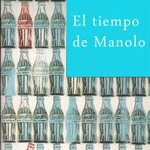 etapa se entregó al disfrute pleno del placer, al que, como tiene demostrado de sobra, sigue entregado en la actualidad. Valiéndose de un estilo narrativo torrencial y vivísimo, González Arias descubre por primera vez lo que para muchos va a resultar imperdonable: los misteriosos detalles de la vida de un pueblo allá por 1975.
etapa se entregó al disfrute pleno del placer, al que, como tiene demostrado de sobra, sigue entregado en la actualidad. Valiéndose de un estilo narrativo torrencial y vivísimo, González Arias descubre por primera vez lo que para muchos va a resultar imperdonable: los misteriosos detalles de la vida de un pueblo allá por 1975.
La amistad, el amor, el sexo, las drogas y la muerte son, en resumidas cuentas, los ingredientes básicos en este «plato fuerte» que no tiene ninguna intención moralizante pero sí una clara vocación de homenaje, público y notorio, a una forma de vivir que, en ciertas circunstancias, resulta la única posible.
If you still don´t know our audiobooks downloading service for members of the library, you only have to make click to see how easy it is to use it. It´s an entertaining way to practise your Spanish and the good thing is that you can take thousands of stories anywhere.
This we keek we recommend you El tiempo de Manolo, a detailed biographical story about the youth of his author, Ismael María González Arias. During that time, he fully enjoyed the pleasures of life, something we are aware that he is still doing at the moment. Using a rich and lively narrative style, González Arias discovers the misterious details of life in a small town for the first time in 1975.
Friendship, love, sex, drugs and death are,to put it in a nutshell, the basic ingredients of a book that doesn´t have any moralizing purpose. It is indeed a public and noticeable tribute to a way of life that in some circumstances turns out to be the only possible one.
Audiolibro de la semana / Audiobook of the week: Adiós a los hombres
Esta semana os proponemos Adios a los hombres, una historia de pasiones y amores turbulentos. Ya sabéis que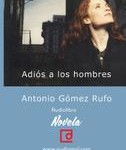 descargar nuestros audiolibros es tan fácil como hacer click.
descargar nuestros audiolibros es tan fácil como hacer click.
La historia: Juan está casado con Claudia y enamorado de Laura, lo saben los tres. Pero lo que no sabe ninguno de ellos es lo que cada uno está dispuesto a hacer para que nada siga siendo así.
Adiós a los hombres es la historia de una encrucijada en el silencio, en la rebeldía y en la renuncia para conseguir una sorprendente idea del amor y evitar, de ese modo, la herida de la soledad.
El autor: Antonio Gómez Rufo posee una extensa obra literaria que abarca prácticamente todos los géneros de la narrativa. Destaca claramente su obra como novelista con obras tan reconocidas como Las lágrimas de Henan (1996) o El secreto del rey cautivo (2005), novela por la que recibió el Premio Fernando Lara de Novela. Su último libro hasta ahora es La más bella historia de amor de Paula Cortázar (2012). Sus obras han sido traducidas al alemán, holandés, portugués, francés, ruso, griego, rumano, polaco y búlgaro.
This week we recommend you a new audiobook , Adiós a los hombres, a story of passion and stormy love. You already know that downloading our audiobooks is as easy as clicking here.
The story: Juan is married to Claudia but he loves Laura, the three of them know it. But none of them knows what the others are willing to do to change things.
Adiós a los hombres is the story of a crossroad between silence, rebelliousness and sacrifice to approach a surprising idea of love in order to avoid the pain of loneliness.
The author: Antonio Gómez Rufo has an extensive literary career that covers practically all genres in narrative. It stands out his work as a novelist with renowned novels such as Las lágrimas de Henán (1996) or El secreto del rey cautivo (2005). He won the Fernando Lara de Novela Award for this novel. His last book so far is La más bella historia de amor de Paula Cortázar (2012). His novels have been translated into German, Dutch, Portuguese, French, Russian, Greek, Romanian and Bulgarian.
Interview with Judith Mok
Judith Mok: Spanish is Great for Poetry
Interview with Judith Mok on 20th September 2012 at the Dámaso Alonso Library of the Instituto Cervantes in Dublin, in connection with her participation in the “Musical Recital Tribute to Federico García Lorca”.
Judith Mok (Bergen, Holland) is soprano, author and poet. She studied at the Royal Conservatory in The Hague. After winning prizes and obtaining grants, she went on to sing a vast soprano repertoire and travelled the world, performing opera, chamber and contemporary music. She has been working for years on her extended vocal techniques. This has led to her deepening interest in sephardic music. Her desire to combine music with literature culminated in the creation of her one woman show Molly says no, about Molly Bloom, the heroine of James Joyce’s Ulysses. Her books of poetry, novels and short stories have been published in both Dutch and English .
Sergio Angulo: —Judith, you are a poet, a novelist, an actress and a classical singer. Could you tell us about all of these aspects of your art?
Judith Mok: —Well, I have been singing since I was fourteen years old. I went to the conservatory in Holland and I studied music there. I started singing professionally when I was 21. I took on my first roles in the opera and made recordings in France. I moved to Paris and started working there as a lyric soprano, and I’m still working as a lyric soprano, more or less, all over the world. I’ve been touring America for the last two years. I made my debut on Broadway in June. I had my own show at the Lincoln Centre, a literary show.
I published my first book of short stories in Dutch, when I was 19., Because my father was the leading poet in Holland, there was a connection there. I was always surrounded by literature, and my father’s Spanish was perfect. Lorca was one of his great loves. I mean, he had a great love for Spanish language, so I was very familiar with Spanish and Spanish literature. I come from more of a literary background than a musical one, but I’ve always been singing and I’m still singing now.
Sergio Angulo: —How do you define yourself?
Judith Mok: —I’m both of those things, I don’t separate them. What I channel and express in my work, I express in both my writing and singing, but not as a different person.I keep both things going. I published my fourth book of poetry less than a year ago. I keep writing and singing, and I keep reading. That’s just me, I just happen to do both things.
Sergio Angulo: How many languages do you speak?
Judith Mok: —Six.
Sergio Angulo: —Which ones?
Judith Mok: —Dutch, French, English, Spanish, Russian, German, and pretty good Italian.
Sergio Angulo: —That’s impressive. And do you write in Dutch and English as well?
Judith Mok: —I don’t write in Dutch anymore. I have written five books in Dutch – three books of poetry and two novels. I married an Irish poet and writer, so I’ve been speaking English at home for the last 27 years. When we moved to Ireland fifteen years ago, I was actually asked by the radio to write pieces about music in English and I said, “Oh, I don’t write in English”. And they said, “Why not?” So I started to write in English and I have a very good editor at home. That’s, of course, my husband.
I just slipped into it and found that I could actually express myself better in English. I was more concise. Maybe I focussed more, because it was a foreign language. Now it’s not a foreign language for me anymore. I never think that I’m speaking English and I haven’t written anything in Dutch for twelve years.
Sergio Angulo: —With regard to Spanish, you said your father spoke it very well.
Judith Mok: —Yes, he did.
Sergio Angulo: —Do you have any other connection with the Spanish language or Spanish culture?
Judith Mok: —Well, I worked in Barcelona for a year. I met my husband in Barcelona. That’s a very big connection. I also sang in Madrid and Granada, Lorca’s place. I’ve always been a great reader of Spanish literature and was always very interested in the world of Jiménez and Machado, and Lorca, of course.
Sergio Angulo: —And I think there is a nice anecdote about the connection between Lorca and your poetry.
Judith Mok: —There is, yes. I read a lot of Lorca and I’m pretty sure he influenced me. I love the language. I love what he stood for, I love his personality, I love his strength, his free spirit. So as a very young woman, I boldly decided to write a poem about his death. I know it’s a very big subject for a young poet, but you do these things when you’re very young. I don’t think I would do it now.
So I wrote a poem about García Lorca and it was the first poem I ever published. Then my first book of poetry came out and the first poem in the book is the poem about the death of Lorca. It was written in Dutch, but it’s translated into English.
Sergio Angulo: —Today, you are going to sing Lorca’s poems in Spanish.
Judith Mok: —I am, yes. Well, he arranged the music himself for his poems.
Sergio Angulo: —How do you feel when singing in Spanish?
Judith Mok: —I don’t sing in a language I don´t understand. I need to really grasp what I’m singing about, and Spanish is a great language for poetry. Spanish is a fantastic, undulating language, so singing in Spanish isn´t difficult. Well, nothing is easy, but it’s relatively easy to sing. It lends itself to music, unlike Dutch, which is a very guttural and throaty language. Spanish is a melodic language.
What I like about his songs is that they’re folk songs. He obviously had a great love for folk culture and music, and that’s why I’m singing a few of these type of songs as well. One is by Manuel de Falla. He and Lorca worked together a lot on El amor brujo. They were both very interested in gypsy culture and so on. I find it very interesting to sing. It’s a different style of singing, it’s less operatic and more focussed. It’s got a different kind of intimacy, a different kind of message. Lorca arranged it very well. He obviously had a very good ear. He was naturally a good composer.
Sergio Angulo: —And just to finish, could you say some words to our audience in Spanish?
Judith Mok: —¿Algo? Que me encanta la poesía de García Lorca, que estoy muy feliz de estar en el Instituto Cervantes. Que espero que le va a gustar a la gente lo que canto: las composiciones de García Lorca, la música y los poemas del gran poeta García Lorca.
Say something? Well, I love the poetry of García Lorca and I´m really happy to be here today at the Cervantes Institute. I hope that everyone likes what I sing – compositions by García Lorca, music and poetry by this great poet.
Recommended links
- [Video] Interview with Judith Mok at the Instituto Cervantes in Dublin, by Sergio Angulo.
- Judith Mok’s official website.
- Judith Mok’s video channel.
About Federico García Lorca
- Federico Garcia Lorca Foundation.
- Federico García Lorca in Centro Virtual Cervantes.
Entrevista con Judith Mok
Judith Mok: El español es estupendo para la poesía
Entrevista con Judith Mok realizada el 20 de septiembre de 2012 en la Biblioteca Dámaso Alonso del Instituto Cervantes de Dublín con motivo de su participación en el “Recital Homenaje a Federico García Lorca”.
Judith Mok (Bergen, Holland) es soprano, escritora y poeta. Estudió música en el Real Conservatorio de La Haya. Tras recibir varios premios y becas, recorrió el mundo como soprano con su variado repertorio operistico y de música de cámara y contemporánea. Durante años ha desarrollado su amplia técnica vocal, lo que la llevó igualmente a profundizar su interes por la música sefardí. Su deseo de combinar música con literatura se materializó en la creación de su espectáculo Molly says no, sobre Molly Bloom, la heroína del Ulises de Joyce. Sus libros de poesía, novelas y relatos han sido publicados en holandés y en inglés.
Sergio Angulo: —Judith, eres poeta, novelista, actriz, y también eres cantante clásica. ¿Nos puedes contar más sobre todos estos aspectos de tu carrera?
Judith Mok: —Bueno, llevo cantando desde que tenía catorce años. Fui al conservatorio en Holanda y estudié música en Holanda. Comencé a cantar profesionalmente cuando tenía veintiún años. Realicé mis primeros papeles en la ópera y grabaciones en Francia. Me mudé a París y empecé a trabajar allí como soprano lírico. Y todavía trabajo como soprano lírico más o menos por todo el mundo. He estado recorriendo América durante los dos últimos años. Hice mi debut en Broadway en junio. Tuve mi propio show en el Lincoln Center, un show literario.
Publiqué mis primeros relatos en holandés cuando tenía diecinueve años. Mi padre era el poeta de más renombre en Holanda, así que siempre tuve relación con la literatura, y el español de mi padre era perfecto. Lorca era una de sus grandes pasiones. Él sentía un gran interés hacia la lengua española, así que yo también estaba muy familiarizada con la lengua y literatura españolas. Provengo más de un mundo literario que de un mundo musical, pero siempre he cantado y continúo cantando.
Sergio Angulo: —¿Cómo te defines a ti misma?
Judith Mok: — Soy las dos cosas, no las separo. Lo que siento y expreso en mi trabajo, lo expreso en mi escritura y en mi canto, pero no como personas distintas. Combino las dos cosas. De modo que he publicado mi cuarto libro de poemas hace menos de un año, y continúo escribiendo, cantando y recitando.
Sergio Angulo: —¿Cuántos idiomas hablas?
Judith Mok: —Seis.
Sergio Angulo: —¿Cuáles?
Judith Mok: —Bueno, holandés francés, inglés, español, ruso, alemán y bastante bien italiano.
Sergio Angulo: —Es impresionante. Y escribes en holandés y también en inglés.
Judith Mok: —Ya no escribo en holandés. He escrito cinco libros en holandés. Tres libros de poesía y dos novelas. Y como he estado viviendo… Bueno, me casé con un poeta y escritor irlandés, así que he hablado inglés en casa durante los últimos veintisiete años, y cuando nos mudamos a Irlanda, hace quince años, me pidieron en la radio que escribiera piezas sobre música en inglés y dije «no escribo en inglés». «¿Por qué no?», me contestaron. Así que empecé a escribir en inglés y… tengo un editor muy bueno en casa. Mi marido, claro.
Luego me metí en el idioma y descubrí que podía expresarme mejor en inglés, que era más conciso. Me centré incluso más, porque era una lengua extranjera. Ahora ya no es una lengua extranjera para mí. Nunca pienso que estoy hablando en inglés.
Sergio Angulo: —En relación a tu español, has mencionado que tu padre lo hablaba muy bien.
Judith Mok: —Sí, así es.
Sergio Angulo: —¿Tienes alguna otra conexión con la lengua o cultura españolas?
Judith Mok: —Bueno, trabajé en Barcelona durante un año. Conocí a mi marido en Barcelona. Esa es una gran conexión. Y he cantado en Madrid y en Granada, la ciudad de Lorca. Siempre he sido una gran lectora de literatura española. Siempre he estado muy interesada en el mundo de Jiménez y Machado. Y por supuesto Lorca.
Sergio Angulo: —Y creo que hay una buena anécdota sobre tu relación con Lorca y tu poesía.
Judith Mok: —La hay. He leído mucho a Lorca. Y estoy bastante segura de que me ha influido. Me encanta su lenguaje, me encanta por lo que luchó, su personalidad, su fuerza, su espíritu libre. Así que, osadamente, cuando era muy joven, decidí escribir un poema sobre su muerte. Ya sé que es un gran tema. Pero cuando uno es joven se hacen estas cosas. No creo que me atreviera a hacerlo ahora.
Escribí un poema sobre García Lorca y ese fue el primer poema que publiqué. Fue escrito en holandés, pero está traducido al inglés.
Sergio Angulo: —Hoy vas a cantar poemas de Lorca en español.
Judith Mok: —Él mismo compuso la música para estos poemas.
Sergio Angulo: —¿Cómo te sientes cuando cantas en español?
Judith Mok: —No canto nada en una lengua que no pueda entender. Necesito sentir completamente lo que estoy cantando, y el español es estupendo para la poesía. El español es una lengua fantástica y ondulante, así que cantar en español no es difícil. Bueno, no hay nada fácil, pero es relativamente fácil cantarlo. Se presta a ello, en contraposición al holandés, por ejemplo, que es una lengua muy gutural y ronca. El español es una lengua melódica.
Lo que me gusta de estas canciones es que son canciones folclóricas. Y Lorca, obviamente, tenía un gran amor hacia la cultura y la música folclórica, y es por eso por lo que voy a cantar algunas canciones relacionadas también con eso. Una de Manuel de Falla. Él y Lorca trabajaron mucho juntos en El amor brujo. Los dos estaban muy interesados en la cultura gitana, así que creo que es muy interesante cantarlo. Es un estilo de canto diferente, menos operístico y más centrado. Es un tipo distinto de intimidad, un distinto tipo de mensaje. Lorca lo adaptó muy bien. Obviamente, tenía muy buen oído, era un buen compositor.
Sergio Angulo: —Y para terminar, ¿nos podrías decir algunas palabras en español?
Judith Mok: —¿Algo? Que me encanta la poesía de García Lorca, que estoy muy feliz de estar en el Instituto Cervantes, que espero que le va a gustar a la gente lo que canto, las composiciones de García Lorca, la música y los poemas del gran poeta García Lorca.
Enlaces Recomendados
- [Vídeo] Entrevista realizada a Judith Mok en el Instituto Cervantes de Dublín por Sergio Angulo.
- Página oficial de Judith Mok.
- Canal de vídeo de Judith Mok.
Sobre Federico García Lorca
- Fundación Federico Garcia Lorca.
- Federico García Lorca en el Centro Virtual Cervantes.
< Listado de entrevistas
Exposición | Exhibition: Geografía postal. Las postales de las familias García Lorca y De los Ríos
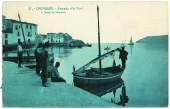 Esta tarde a las seis inauguramos una nueva exposición: Geografía postal. La postales de las familias García Lorca y De los Ríos. Después tendremos el recital “Homenaje a Federico García Lorca” con la soprano Judith Mok y la pianista Dearbhla Collins.
Esta tarde a las seis inauguramos una nueva exposición: Geografía postal. La postales de las familias García Lorca y De los Ríos. Después tendremos el recital “Homenaje a Federico García Lorca” con la soprano Judith Mok y la pianista Dearbhla Collins.
¿Quién no ha escrito alguna vez una tarjeta postal? Ahora ya casi nadie envía o recibe postales. Todo esto ha sido sustituido por el correo electrónico o los mensajes de móviles que poco a poco han ido dejando en el olvido a las postales. Sin embargo, a comienzos del siglo pasado, las postales se utilizaban para enviar mensajes cortos a amigos o familiares. Este es el caso de Federico García Lorca y su familia.
En la primera mitad del siglo XX estas dos familias (García Lorca y De los Ríos), se enviaron postales casi todos los días, creando así una amplísima colección que el Instituto Cervantes te invita a conocer. Martin Parr, fotógrafo y especialista en postales, ha seleccionado las más importantes para esta exposición, que nos ayudará a adentrarnos en la faceta más íntima de la vida del poeta.
La exposición estará abierta del 20/09/2012 al 17/11/2012.
El horario de visita es: Lun.- jue.: 14-19 h. Sáb: 10-14 h. Cerrado vie., dom. y festivos
We open a new exhibition today at 6pm: “Postal Geography, García Lorca and De los Ríos families´postcards”. It will be followed by the recital “Tribute to Federico García Lorca” by soprano Judith Mok and pianist Dearbhla Collins.
Who hasn´t written a postcard? People hardly send or receive postcards nowadays. Emails and text messages have substituted them and have made them fall into oblivion. At the beginning of the previous century postcards were used to send brief messages to friends or family. In this case, the Spanish poet Federico García Lorca and his family.
In the first half of the 20th Century these two families, García Lorca and De los Ríos sent each other postcards almost daily. Martin Parr, photographer and a specialist in postcards has selected the most important ones for this exhibition. This display will bring us closer to the most intimate side of the poet´s life.
The exhibition will open fro the 20/09/2012 to 17/11/2012.
Opening hours: Mon-Thur: 2-7pm. Sat: 10am-2pm. Closed on Fridays, Saturdays and Bank Holidays.
Audiolibro de la semana | Audiobook of the week: La mula
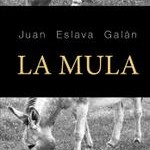 Tras un pequeño paréntesis veraniego retomamos nuestras recomendaciones del fantástico catálogo de audiolibros con el que contamos en la biblioteca. Esta semana os ofrecemos una visión diferente de la Guerra Civil Española a través de una historia cargada de humor y buenos sentimientos. Para disfrutarla, ¡solo tienes que hacer click!
Tras un pequeño paréntesis veraniego retomamos nuestras recomendaciones del fantástico catálogo de audiolibros con el que contamos en la biblioteca. Esta semana os ofrecemos una visión diferente de la Guerra Civil Española a través de una historia cargada de humor y buenos sentimientos. Para disfrutarla, ¡solo tienes que hacer click!
La historia: La mula narra la historia del humilde cabo Juan Castro al que le importa más encontrar a su mula preferida que ganar la guerra. Por eso sale tras ella y, poco después de atravesar la línea de frente, se ve envuelto en un episodio tan peligroso como hilarante que, contra su voluntad, lo va a convertir en un héroe de guerra. La mula es una atrevida desmitificación de la guerra civil. Un personaje pícaro y tierno para desmitificar la guerra.
El autor: Juan Eslava Galán nació en Arjona (Jaén) en 1948; se licenció en Filología Inglesa por la Universidad de Granada y se doctoró en Letras con una tesis sobre historia medieval. Fue profesor de bachillerato durante treinta años, una labor que simultaneó con la escritura de novelas y ensayos de tema histórico. Ha ganado los premios Planeta (1987), Ateneo de Sevilla (1991), Fernando Lara (1998) y Premio dela Crítica Andaluza (1998). Sus obras se han traducido a varios idiomas europeos.
After the summer break we will recommend you once again the very best of our great catalogue of audiobooks. This week we suggest you a different vission of the Spanish Civil World through a story packed with humour and good feelings. You can enjoy it just by clicking here!
The story: La mula tells the story of a humble corporal who is more interested in getting his favourite mule back than winning the war. He goes after it and right after crossing the battlefront, he is involved in a dangerous and hilarious experience that makes him a war hero against his will. La mula is a daring demystification of Civil War with a cheeky and loving main character.
The author: Juan Eslava Galán was born in Arjona (Jaen) in 1948. He got a degree in English Literature at the University of Granada and made his PhD with a thesis about the Middle Ages. He was a Secondary School teacher for over forty years, he combined this job with writing novels and essays focussed on historical times. He won the Planeta Award (1987), Ateneo de Sevilla (1991), Fernando Lara (1998) and the Andalusian Criticism Literary Award. His books have been translated into several languages.
[Video] Ignacio Martínez de Pisón en la biblioteca del Instituto Cervantes de Dublín
El pasado mes de mayo, Ignacio Martínez de Pisón nos visitó para participar en el homenaje a Félix Romeo que tuvo lugar en nuestro centro. Ese mismo día fue entrevistado por nuestra compañera Carmen Sanjulián en nuestra biblioteca.
Ignacio Martínez de Pisón (Zaragoza, 1960), es escritor y guionista. Sus novelas y relatos han sido galardonadas con los premios Rodolfo Walsh y Dulce Chacón. Elogiado por la crítica de varios paises europeos, su obra ha sido traducida a varios idiomas.
29th of May, Ignacio Martínez de Pisón was interview by one of our teachers, Carmen Sanjulián, on the occasion of his visit to the Instituto Cervantes in Dublin to participate in the tribute to Félix Romeo that took place in our Café Literario.
Ignacio Martínez de Pisón was born in Zaragoza (1960). His work as a writer has achieved recognition with the awards Rodolfo Walsh and Dulce Chacón and received outstanding critic’s reviews from various European countries. His novels have been translated into several languages.
Federico García Lorca: nuestro autor del mes de septiembre
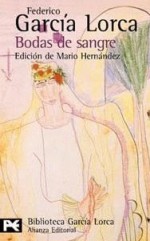 Desde el día 20 de este mes y hasta el 17 de noviembre contaremos en el Instituto con la exposición “Geografía postal. Las postales de las familias García Lorca y De los Ríos”.
Desde el día 20 de este mes y hasta el 17 de noviembre contaremos en el Instituto con la exposición “Geografía postal. Las postales de las familias García Lorca y De los Ríos”.
En la biblioteca, aprovechamos esta ocasión para recordar al que en la actualidad es el poeta español más leído de todos los tiempos. Fundamental es también su figura en el teatro español contemporáneo. En 1915 comienza a estudiar Filosofía y Letras y Derecho en la Universidad de Granada. Formó parte de El Rinconcillo, centro de reunión de los artistas granadinos donde conoce a Manuel de Falla quien ejerció una gran influencia en él, transmitiéndole su amor por el folclore y lo popular.
A partir de 1919, se instaló en Madrid, en la Residencia de Estudiantes, donde conoció a Juan Ramón Jiménez y a Machado, y trabó amistad con poetas de su generación y artistas como Buñuel o Dalí. En este ambiente, Lorca se dedicó con pasión no sólo a la poesía, sino también a la música y el dibujo, y empezó a interesarse por el teatro.
From the 20th of this month until the 17th of November, you can enjoy at the Institute the exhibition “Postal Geography. García Lorca and De los Ríos Families´s Postcards”.
At the library, we take the chance to remember the most read Spanish poet of all times. He is also an essential part of contemporary Spanish theatre. He started to study Philosophy and Literature and also took Law studies at the University of Granada. He was part of El Rinconcillo, a meeting point for the artists of Granada where he met Manuel de Falla who was a big influence, learning from him about folk and tradition .
In 1919 he moved to Madrid and lived in the Residence for Students, where he met Juan Ramón Jiménez and Machado and he became good friend of poets and artists of his generation such as Buñuel or Dalí. Lorca worked with passion in that environment in poems and also in music, drawing and he started to be interested in theatre.
Luis Alegre y David Trueba en el Instituto Cervantes de Dublín
Luis Alegre y David Trueba nos concedieron una entrevista el pasado mes de mayo. Los dos participaron en el homenaje a Félix Romeo celebrado en el centro. Un día después, se proyectó el documental La silla de Fernando, dirigido por ellos, para dar a conocer la figura de Fernando Fernán-Gómez, intelectual clave del siglo XX español: actor, escritor y director de cine, teatro y televisión. Sobre estos y otros temas hablaron con nuestra compañera Carmen Sanjulián.
Luis Alegre (Lechago, Teruel, 1962) polifacético escritor, periodista, cineasta, y presentador de televisión, ha recibido múltiples reconocimientos por su carrera.
David Trueba (Madrid, 1969) es uno de los jóvenes talentos del cine español que ha trabajado también como actor, guionista, escritor y periodista.
David Trueba and Luis Alegre uncover Fernando Fernán-Gómez, an outstanding character who enriched Spanish culture with his work: actor, writer and television, theatre and cinema director. Fernán-Gómez is a giant of the Spanish 20th Century and an essential figure in Spain’s cultural heritage.
Luis Alegre (Lechago, Teruel, 1962) is a versatile writer, journalist, film maker and television presenter. He has received various awards in recognition of his invaluable contribution to Spanish cinema.
David Trueba (Madrid, 1969) is one of the young talents of Spanish cinema. He has also worked as an actor, script writer, writer and journalist.
